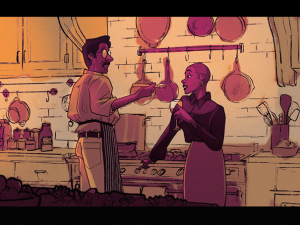Freedom’s Haunt
Mike Flanagan’s Haunting of the Bly Manor (2020) and Freedom
By Deniz Akkaya, Melis Baş and Aylin Şengezer

Most people violate other people’s individual rights through being encouraged by social norms. In a very mundane sense, one of the most violated rights concerns the freedom of individuals such the freedom to choose their own way of living. People who lie outside these norms are often banished and forced outside the society. This predicament constitutes one of the subtexts of The Haunting of the Bly Manor. Indeed, all the characters in the TV series are outside social norms one way or another: Jamie, a woman who has a man-like name and a job; Hannah Grose, a woman with an extremely short hair; Owen Sharma, a man who is a cook. Gender roles shape our life more than we give it credit for, and to maintain our life in a society shaped by these ideas often drives us to melancholy by causing alienation as we feel normative pressure in all the moves and decisions we make. In the Haunting, all characters are escaping from the lives they lived outside of the manor in order to build a freer way of life for themselves. Dani escapes from her past: she does not want to think about her dead fiancé for whose death she feels responsible. We learn that he died when she broke up with him after she realized that her sexual orientation was different. Mrs. Grose starts to work as a housekeeper in the manor after her husband left her for a new life just like Dani. Owen, the chef of the house, works there when he is not taking care of his mother, and he sees his job in the manor as a distraction. Lastly, Jamie sees her garden as an escape from people; she would rather stay alone in the manor than socialize, because she thinks people are not sincere at all. Accordingly, they all came to the manor to live freely without feeling any unjust normative pressure from others. That is why the Bly Manor becomes the freest place where all the characters can act like who they actually are. Even dead ones are not able to leave it as it symbolizes an unrestricted environment where the inhabitants, real or spectral, feel much freer. But the series also reminds us that it is never possible to attain full freedom from social norms as none of the characters leave their past lives entirely behind. They still become haunted by guilt and the memory of judgmental thoughts continue to intimidate them. The dead ones of the manor lose the features of their faces, which might be understood as a metaphor for the loss of one’s identity through social pressure. In this sense, the manor provides them only with a delusional sense of freedom; the freedom that they really desire is not inside the manor but outside in the actual world which they escaped from instead of trying to change it.
